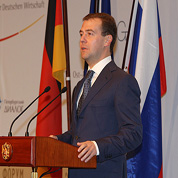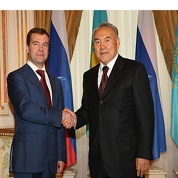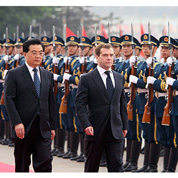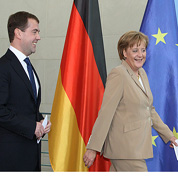Reading meanings into the choices of Medvedev’s countries of debut on the international arena

Following up on his pre-inaugural promises on the chosen destinations for his first foreign visits, President Dmitry Medvedev kicked off his international policy agendas with historical visits to Kazakhstan in the CIS region and China in the Far East, before going westward to Germany in the eurozone, thus signaling a troika of nations and key directions that will define his diplomatic policies on the geopolitical arena.
The choices of these three countries highlighted their geopolitical importance for and historical affinity with Moscow on key issues of regional and global magnitude on the Kremlin’s international policy agendas, which include strengthening the CIS and boosting economic integration within the amorphous bloc, building a new multi-vector world order on the basis of the UN with key roles being played by several nations, particularly China, instead of the current global geopolitical architecture lopsided in favor of Washington. And, finally, deepening ties with key EU states, namely Germany, as Russia searches for reliable partners in the EU and the whole Western world to tackle European issues and global challenges begging for urgent solutions today.
"I must say that there are some people, who do not like the growing cooperation between Moscow and Beijing on issues of regional and global importance."
The choices of Kazakhstan and China for the first maiden visits only demonstrated that the Kremlin places more premium on its current relationships with its Eastern partners today that are a lot more cordial than those with its Western partners. Thus, the visits to Astana and Beijing were meant to send clear signals to Brussels and Washington that, unlike in the 1990s, when economic exigencies deprived Moscow of choices of partnership on the geopolitical arena, today’s Russia has several choices regarding with whom to enter into strategic cooperation accords. Besides, with a booming economy buoyed by the unprecedented windfalls of petrodollars, the Kremlin is absolutely free today, financially speaking, to run pragmatic foreign policies that best defend its national interests and enter into cooperation with international partners that are ready to dialog with it on equal terms and share common views with it on all issues of regional and global importance. Going forward, it needs to be specially noted that in the past three months since taking office in May, Medvedev has already met with Kazakh President Nursultan Nazarbayev and German Federal Chancellor Angela Merkel in and outside Russia three times, and twice with Chinese President Hu Jintao, another record set by the new Russian president in his interactions with his strategic partners within the first 100 days in the Kremlin.
The first destination on the maiden visit list - Kazakhstan
Seen in this context, the visit to Kazakhstan seemed only natural. For one, Kazakhstan has been one of Moscow’s closest and most reliable allies in the post-Soviet region. Starting from its domestic policies, which grant the Russian language an official status and do not discriminate against ethnic Russians as other former Soviet republics, notably, the Baltic States, do on their territories, to issues of global importance, Kazakhstan has been sharing most of Russia’s views on almost all issues, including the future of the CIS, where Nazarbayev, the only leader remaining from the first group of leaders that founded the commonwe alth on the debris of the disintegrated Soviet Union in 1991, is a key player bent on full-scale integration of the economies of the CIS member-states. For instance, one of Nazarbayev’s sensational initiatives during Medvedev’s visit on May 22 was a call for the reanimation of the Unified Economic Space in the CIS, with Russia playing a major centripetal role, a project that was earlier torpedoed by the CIS-centrifugal states, led by Ukraine and pro-Western countries.
alth on the debris of the disintegrated Soviet Union in 1991, is a key player bent on full-scale integration of the economies of the CIS member-states. For instance, one of Nazarbayev’s sensational initiatives during Medvedev’s visit on May 22 was a call for the reanimation of the Unified Economic Space in the CIS, with Russia playing a major centripetal role, a project that was earlier torpedoed by the CIS-centrifugal states, led by Ukraine and pro-Western countries.
Indeed, the goodwill nature of the bilateral relationship was further strengthened by a number of new long-term agreements penned by the two countries’ leaderships during the visit to the central Asian state. Suffice it to name just a few of these accords, namely, the agreement on drafting a plan of joint actions for 2009-10, the development of the Caspian gas pipeline, the expansion of the Central Asia-Center oil pipeline, the creation of a joint venture company in the nuclear sector and the participation of Russia in the development Kazakhstan’s atomic stations.
The friendly relationships with Astana contrasted sharply with the actions of other Russia’s neighbors in the CIS and Eastern Europe such as Ukraine, Georgia, Azerbaijan, the Baltic States and Poland, traditionally referred to as the West’s “new sanitary corridor” around Moscow. The leaders of these nations met at an Energy Summit in Kiev during Medvedev’s visit to Astana to push for an alternative energy-transportation route that will bypass Russia from the Caspian to the Western markets. The declaration on the Creation of a Unified Transit Space — signed at the Kiev Summit by the Russia’s neighbors eager to leverage their energy transit potentials — is aimed at weakening Russia’s growing role on the pan-European energy market.
However, without Kazakhstan, whose share of the enormous Caspian energy resources is of critical importance to all the energy projects originating from this littoral region, the largely anti-Russia declaration signed by nations that have no industrially mineable energy resources, with the exception of Azerbaijan, is likely to remain a wishful “white elephant project” that can never be executed. A further proof of this is evident in the fact that the current Baku-Tbilisi-Ceyhan oil pipeline — also specially created to bypass Russia as it moves from Baku through Tbilisi to Ceyhan in Turkey — currently lacks sufficient oil volume to fill the pipe to its projected capacity.
The continuation of the trip in China
Similarly, Medvedev’s visit to Beijing also fitted naturally into the Kremlin’s longstanding diplomatic doctrine in the Eastern direction, which sees China and India as a core foundation of a new trilateral alliance, capable of counterbalancing the current U.S.-led Western-nations coalition that has been attempting to impose its unilateral views on almost all global issues — from the global war on terrorism to economic issues — at the detrimental of other countries’ national interests.
Indeed, apart from the currently booming bilateral relationships, which got a second breath of life after the final regulations of all the thorny territorial issues that had marred the ties between the two nations in the past, Moscow and Beijing now frequently have convergent views on all almost issues on the regional and global geopolitical arena. Ïðîåêòû îäíîýòàæíûõ äîìîâ Z500 - http://z500proekty.ru/doma/tag-odnoetazhnie.html . Thus, examples of joint efforts include their similar stances on the irrevocably dominant role of the UN on all issues to specific issues of regional concerns such as their convergent positions on the Iranian nuclear program, where they both advocate for sustained diplomatic actions rather than taking swift military measures against Tehran as advocated by Washington and some of its EU allies, and Kosovo’s self-declared independence from Belgrade, which both Moscow and Beijing have vowed not to recognize.
Besides, the overt demonstration of exceptionally amiable relationships with China has also been interpreted by experts as a special signal sent by the Kremlin to the Cold War nostalgic hawks in the Washington and Brussels business and political establishments that their unjustified Russophobic policy could force Moscow into a closer alliance with Beijing with all the negative implications for the Western world. Indeed, taking into consideration China’s current political and economic might, which is growing year-on-year at an exponential rate, such an alliance between Moscow and Beijing is capable of turning these two gigantic and highly ambitious capitals into an alternative global decisions-making platform that will reduce the attractiveness in the Washington-EU stance on global issues, which most often runs counter to the wishes of even their allies in several parts of the world.
 It seems the Chinese leadership is also ready to play along with Moscow on its search for reliable partners to build a new, multi-vector international diplomacy, evident in the wide-ranging declaration on global issues signed by Medvedev and the Chinese president during the visit on May 23. Thus, the declaration highlighted Russia and China’s common positions and/or views on all thorny global issues, where Moscow currently have huge differences with Washington and its European satellite allies, namely, the U.S. plans for the deployment of global radar shield in Eastern Europe, militarization of international diplomacy, reformation of the UN, etc, amongst others. Experts say this accord with Beijing will help quench the appetite of Washington hawks, who are calling for the creation of a new alliance of “true democratic nations” that will naturally exclude China and Russia seen as not “democratic enough” to join the new club, or those looking for alternative mechanisms of taking key decisions with global consequences outside the UN and its Security Council, where Moscow and Beijing currently have veto powers to rein in policies that contravene international laws and/or their respective national interests on the global arena. Also, both Moscow and Beijing agreed to pen the so-called “Big Agreement for 2009-12” that will map out the two nations’ joint plans for broader cooperation on all these and other issues.
It seems the Chinese leadership is also ready to play along with Moscow on its search for reliable partners to build a new, multi-vector international diplomacy, evident in the wide-ranging declaration on global issues signed by Medvedev and the Chinese president during the visit on May 23. Thus, the declaration highlighted Russia and China’s common positions and/or views on all thorny global issues, where Moscow currently have huge differences with Washington and its European satellite allies, namely, the U.S. plans for the deployment of global radar shield in Eastern Europe, militarization of international diplomacy, reformation of the UN, etc, amongst others. Experts say this accord with Beijing will help quench the appetite of Washington hawks, who are calling for the creation of a new alliance of “true democratic nations” that will naturally exclude China and Russia seen as not “democratic enough” to join the new club, or those looking for alternative mechanisms of taking key decisions with global consequences outside the UN and its Security Council, where Moscow and Beijing currently have veto powers to rein in policies that contravene international laws and/or their respective national interests on the global arena. Also, both Moscow and Beijing agreed to pen the so-called “Big Agreement for 2009-12” that will map out the two nations’ joint plans for broader cooperation on all these and other issues.
Economically, Russia’s current relationships with China are at their historical best, with trade turnover between the two nations rising annually by over 30% over the past eight years, to $48bln in 2007, while the highly ambitious target of raising this figure to $60bln, previously set for 2010, will be met either this year or in 2009, but definitely before 2010, according to both governments’ officials. Naturally, Medvedev is aware of all the implications a robust alliance with China and all its probable positive and/or negative interpretations in the West. “Our relationships demonstrate an example of strategic interactions between two large countries, which are solving major issues through cooperation that has become a key factor ensuring global security today,” Medvedev said. “I must say that there are some people, who do not like this growing cooperation between Moscow and Beijing on issues of regional and global importance.”
The maiden visit’s final lap in Berlin
Medvedev rounded up his maiden foreign trips with a visit to Berlin on June 5, where he met with the German political and business elite, and spoke on several topics, ranging from his domestic policies to energizing cooperation with Germany, and by extension, with other EU states. Unlike his visits to Astana and Beijing, where concrete agreements were penned, the Berlin visit was mainly introductory in character, as it was designed to give the larger Western audience an opportunity to meet with the new Russian leader and get first impressions. Therefore, no documents were signed by Medvedev and his host, Merkel.
"The general impression was that people in Germany, just like the rest of other Western states, expect Medvedev to become the president that will push Russia further toward democracy, deeper reforms and liberalism."
After highlighting his domestic policies, with key emphasis on its crucial legal aspects, Medvedev delved into international affairs, starting from the Nord Stream project, which he said is facing problems stemming from “the negative stereotypic mindsets” in some EU states. “Due to stereotypic mindsets, even the promotion of evidently profitable economic projects is being hamstrung by unjustified fears,” he noted.
 Speaking on NATO, Medvedev said the alliance’s unjustified expansionist policy, especially in the part envisaging the extension of full membership to Ukraine and Georgia, would completely damage the relationships with Moscow, if the alliance honors its promises to Kiev and Tbilisi, despite the Kremlin’s negative stance on those issues. On Europe and the new ways of boosting cooperation on the continent, Medvedev called for a Pan-European Summit, where all the European nations, representing their national interests outside their bloc affiliations, will meet to work out a draft of a new European Security Pact, similar to the Helsinki Accord, that will leverage the continent’s potential to higher level in the contemporary world and help in the resolutions of the conflicts that at times arise among European states.
Speaking on NATO, Medvedev said the alliance’s unjustified expansionist policy, especially in the part envisaging the extension of full membership to Ukraine and Georgia, would completely damage the relationships with Moscow, if the alliance honors its promises to Kiev and Tbilisi, despite the Kremlin’s negative stance on those issues. On Europe and the new ways of boosting cooperation on the continent, Medvedev called for a Pan-European Summit, where all the European nations, representing their national interests outside their bloc affiliations, will meet to work out a draft of a new European Security Pact, similar to the Helsinki Accord, that will leverage the continent’s potential to higher level in the contemporary world and help in the resolutions of the conflicts that at times arise among European states.
The overall impressions from the debut
While the geopolitical outcomes and expectations from the Astana and Beijing visits were known in advance, the trip to Germany was seen as the real barometer that will indicate the successfulness of Medvedev’s debut on the geopolitical arena. And, going by the German media reports, it seemed that the debut on the Western front was also equally successful.
Summing up the Germans’ impressions, Dirk Emmerich, a former Moscow-based correspondent for one of German television channels, said Medvedev gave the impression of an amicable, open and fully independent politician. “The first perception was that he gave the impression that he is by himself, and not like a person acting on the premises that ‘I was sent here by Putin’,” he added. “The second impression was that people in Germany, just like the rest of the Western states, expect Medvedev to become the president that will push Russia further toward bonafide democracy, deeper reforms and liberalism.”












 Web design,
Web design,